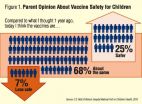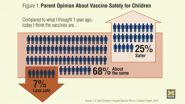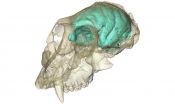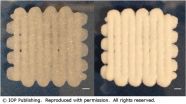Safer, with more benefits: Parents' vaccine views shifting
A quarter of parents believe vaccines are safer now than they thought a year ago; a third more supportive of school and daycare immunization requirements
2015-07-06
(Press-News.org) ANN ARBOR, Mich. -- Over the same time period that multiple outbreaks of measles and whooping cough made headlines around the country, parents' views on vaccines became more favorable, according to a new nationally-representative poll.
The University of Michigan C.S. Mott Children's Hospital National Poll on Children's Health asked parents in May how their views on vaccinations changed between 2014 and 2015 - during which two dozen measles outbreaks were reported in the U.S., including a multi-state outbreak traced to Disneyland.
One-third of parents who participated in the poll indicated they now perceived more benefits of vaccines, while one-quarter perceived vaccines to be safer now than a year ago. One--third of parents also reported being more supportive of school and daycare entry requirements for vaccination than they were the previous year.
"Over the last year there have been high-profile news stories about outbreaks of vaccine-preventable diseases like measles and whooping cough. These news reports may be influencing how parents perceive childhood vaccines across the country," says Matthew M. Davis, M.D., M.A.P.P., director of the National Poll on Children's Health and professor of pediatrics and internal medicine in the Child Health Evaluation and Research Unit at the U-M Medical School.
"For a quarter to a third of parents to say that their views on the safety and benefits of vaccines have shifted in just a year's time is quite remarkable. Parents' perceptions that vaccines are safer and offer more benefits are also consistent their stronger support of daycare and school entry requirements for immunizations."
Parents were also asked their opinions about the risk of measles and whooping cough compared to a year ago. Two out of every five parents, or 40 percent, believe the risk of measles for children in the U.S. is higher than what it was one year ago. Another 45 percent say the risk is about the same and 15 percent say the risk is lower.
A resurgence of whooping cough and measles over the last few years has triggered a national debate over vaccinations and garnered ongoing media coverage. On June 30, California Gov. Jerry Bill signed a bill to impose one of the nation's strictest vaccination laws following the outbreak linked to Disneyland in December 2014 that sickened more than 100 people. A surge in vaccine-preventable disease outbreaks have also spanned across the country from New York to Michigan to Washington State.
The majority of parents polled believe vaccines have the same benefits as a year ago and think the safety of vaccines has stayed the same. A minority of parents also had less favorable views on vaccines, with 7 percent perceiving less safety, 5 percent perceiving fewer benefits and 6 percent saying they were less supportive of school and daycare entry requirements that the previous year.
"Outbreaks of disease can safely be prevented through childhood vaccination, but there are deeply-held convictions about parents' autonomy and remaining concerns among some parents about vaccine safety," says Davis, who is also with the U-M School of Public Health, Gerald R. Ford School of Public Policy, and deputy director for U-M's Institute for Healthcare Policy and Innovation.
"Media coverage of outbreaks over the past year, accompanied by messages about vaccines for whooping cough and measles, may be swaying parents' opinions toward stronger beliefs in the positive aspects of vaccines. The impact of such shifts in perception will ultimately be measured by whether more parents vaccinate their kids."
INFORMATION:
Full report: C.S. Mott Children's Hospital National Poll on Children's Health
Broadcast-quality video and infographic available.
Learn more: C.S. Mott Children's Hospital National Poll on Children's Health: mottnpch.org/reports-surveys/safer-more-benefits-parents%E2%80%99-vaccines-views-shifting
Website: MottNPCH.org Facebook: http://www.facebook.com/mottnpch Twitter: @MottNPCH
Purpose/Funding: The C.S. Mott Children's Hospital National Poll on Children's Health - based at the Child Health Evaluation and Research Unit at the University of Michigan and funded by the University of Michigan Health System - is designed to measure major health care issues and trends for U.S. children.
Data Source: This report presents findings from a nationally representative household survey conducted exclusively by GfK Custom Research, LLC (GfK), for C.S. Mott Children's Hospital via a method used in many published studies. The survey was administered in May 2015 to a randomly selected, stratified group of parents age 18 and older with at least one child age 0-17 (n=1,416) from GfK's web-enabled KnowledgePanel® that closely resembles the U.S. population. The sample was subsequently weighted to reflect population figures from the Census Bureau. The survey completion rate was 55% among parent panel members contacted to participate. The margin of error is ± 2 to 3 percentage points.
The findings of the poll reflect the views of the public and do not represent the opinions or positions of the University of Michigan, the University of Michigan Health System, or the C.S. Mott Children's Hospital National Poll on Children's Health.
[Attachments] See images for this press release:


ELSE PRESS RELEASES FROM THIS DATE:
2015-07-06
A spider's web is one of the most intricate constructions in nature, but its precious silk has more than one use. Silk threads can be used as draglines, guidelines, anchors, pheromonal trails, nest lining, or even food. And each use requires a slightly different type of silk, optimized for its function.
"Each type of silk has similar proteins, but they are synthesized differently," said Sinan Keten, assistant professor of mechanical and civil engineering at Northwestern University's McCormick School of Engineering. "Then the spider knows how fast to reel the silk to get ...
2015-07-06
An ambitious policy package is essential for the UK to transform its energy system to achieve the deep reductions in carbon emissions required to avoid dangerous climate change, according to research led by UCL scientists. To meet climate targets set for 2050, policies need to ensure strong action is taken now, while preparing for fundamental changes in how energy is provided and used in the long term.
The study is part of the Deep Decarbonization Pathway Project (DDPP) which is coordinated by the Institute for Sustainable Development and International Relations (IDDRI) ...
2015-07-06
It may sound counter-intuitive, but crushing up bees into a 'DNA soup' could help conservationists understand and even reverse their decline - according to University of East Anglia scientists.
Research published today in the journal Methods in Ecology and Evolution shows that collecting wild bees, extracting their DNA, and directly reading the DNA of the resultant 'soup' could finally make large-scale bee monitoring programmes feasible.
This would allow conservationists to detect where and when bee species are being lost, and importantly, whether conservation interventions ...
2015-07-04
BARCELONA-LUGANO, 4 July 2015 - Patients with metastatic colorectal cancer (mCRC) that are mutation-free in the KRAS, NRAS, BRAF and PIK3CA genes showed significant benefit from continuing anti-epidermal growth factor receptor (EGFR) therapy beyond progression following first-line chemotherapy and an anti-EGFR monoclonal antibody, according to study results (1) presented today at the ESMO 17th World Congress on Gastrointestinal Cancer in Barcelona, Spain.
Prof Fortunato Ciardiello from Seconda Università degli Studi di Napoli, Italy, presented results from the CAPRI-Goim ...
2015-07-03
Mice that are exposed to the powerful smell of cat urine early in life do not escape from cats later in life. Researchers at the A. N. Severtsov Institute of Ecology and Evolution, Russia, have discovered that mice that smell cat urine early in life, do not avoid the same odour, and therefore do not escape from their feline predators, later in life.
"Because the young mice (less than 2 weeks-old) are being fed milk while being exposed to the odour, they experience positive reinforcement," says Dr Vera Voznessenskaya, one of the lead researchers behind this study. "So ...
2015-07-03
To mark the final day of the 65th Lindau Nobel Laureate Meeting, on Friday, 3 July, over 30 Nobel laureates assembled on Mainau Island on Lake Constance signed a declaration on climate change. The "Mainau Declaration 2015 on Climate Change" states "that the nations of the world must take the opportunity at the United Nations Climate Change Conference in Paris in December 2015 to take decisive action to limit future global emissions." It is expected that a new international agreement on climate protection will be approved at the 21st UN Climate Conference to succeed the ...
2015-07-03
DURHAM, N.C. -- The brain hidden inside the oldest known Old World monkey skull has been visualized for the first time. The creature's tiny but remarkably wrinkled brain supports the idea that brain complexity can evolve before brain size in the primate family tree.
The ancient monkey, known scientifically as Victoriapithecus, first made headlines in 1997 when its fossilized skull was discovered on an island in Kenya's Lake Victoria, where it lived 15 million years ago.
Now, thanks to high-resolution X-ray imaging, researchers have peered inside its cranial cavity ...
2015-07-03
BARCELONA-LUGANO, 3 July 2015 - The phase IIIb CONSIGN study has confirmed the benefit of regorafenib in patients with previously treated metastatic colorectal cancer (mCRC), researchers announced at the ESMO 17th World Congress on Gastrointestinal Cancer 2015 in Barcelona.(1) The safety profile and progression free survival were similar to phase III trial results.
CONSIGN was a prospective, observational study that was initiated to allow patients with mCRC access to regorafenib before marketing authorisation and to assess safety, which was the primary endpoint. The randomised ...
2015-07-03
Spiders travel across water like ships, using their legs as sails and their silk as an anchor, according to research published in the open access journal BMC Evolutionary Biology. The study helps explain how spiders are able to migrate across vast distances and why they are quick to colonise new areas.
Common spiders are frequently observed to fly using a technique called 'ballooning'. This involves using their silk to catch the wind which then lifts them up into the air. Ballooning spiders are estimated to move up to 30 km per day when wind conditions are suitable, helping ...
2015-07-03
Scientists have developed a new technique allowing the bioprinting at ambient temperatures of a strong paste similar to 'play dough' capable of incorporating protein-releasing microspheres.
The scientists demonstrated that the bioprinted material, in the form of a micro-particle paste capable of being injected via a syringe, could sustain stresses and strains similar to cancellous bone - the 'spongy' bone tissue typically found at the end of long bones.
This work, published today (3 July 2015) in the journal Biofabrication, suggests that bioprinting at ambient temperatures ...
LAST 30 PRESS RELEASES:
[Press-News.org] Safer, with more benefits: Parents' vaccine views shifting
A quarter of parents believe vaccines are safer now than they thought a year ago; a third more supportive of school and daycare immunization requirements





